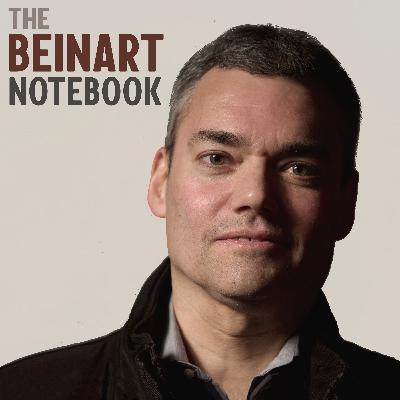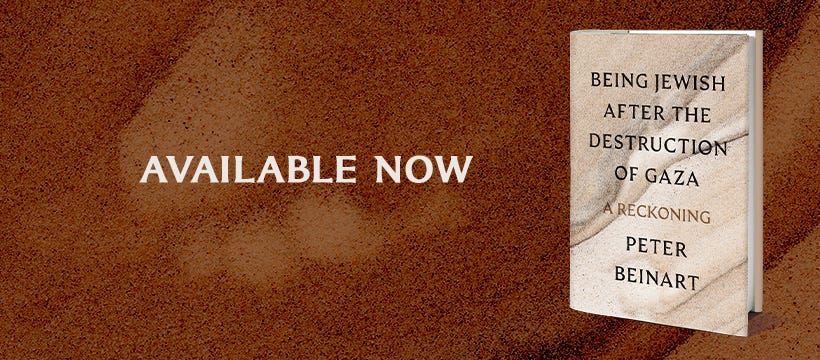It’s a Blessing if the Hostages Go Free and the Bombs Stop
Description
A list of ways to help Palestinians in Gaza.
This Friday’s Zoom call will be at 1 PM Eastern, our usual time. Our guests will be the former PLO negotiator Hussein Agha and the former Clinton, Obama and Biden administration official, Rob Malley. They’ll talk about their new book, Tomorrow is Yesterday: Life, Death, and the Pursuit of Peace in Israel/Palestine. I’ll ask what they’ve learned from decades of seeing Israeli, Palestinian and American policy from the inside.
Cited in Today’s Video
Yeshayahu Leibowitz’s essay on colonialism and terrorism.
Mouin Rabbani on the Trump plan.
Things to Read
(Maybe this should be obvious, but I link to articles and videos I find provocative and significant, not necessarily ones I entirely agree with.)
In Jewish Currents (subscribe!), Avigayil Halperin talks to Audrey Sasson about whether it’s possible to atone for genocide.
39% of American Jews think Israel is committing genocide.
Washington Democrats turn against AIPAC.
See you on Friday,
Peter
VIDEO TRANSCRIPT:
So, I have these two kind of contradictory feelings about the Trump plan on Gaza. The first is that I hope it goes through. I hope it’s implemented. I just desperately, desperately hope that these Israeli hostages are returned and can go back to their families. And I desperately hope that Palestinians can wake up one day in the coming days, and just not worry that they’ll be killed by an Israeli bomb, and that their children will be able to have more to eat. I mean, just at a basic human level, that would be a really just a blessing.
It’s also, though, really important just to remember, because I think there’s a certain kind of discourse that tends to take place about these diplomatic negotiations, a kind of insider-y discourse about how it’s going to be implemented, and what the role the Palestinian Authority is going to play, and what different Arab governments are going to do, and all this stuff, which just can often, I just find, kind of, like, completely obscure, like, the basic foundational realities, which always need to be kept front and center, right?
The basic foundational realities are that Palestinians in Gaza, the West Bank, and East Jerusalem live under the control of a state that does not grant them the most basic of rights, the right of citizenship. This state, the Israeli state, has life and death power over them, and yet they can’t vote for that government that controls their lives. This will be true after the Trump plan is implemented, if it’s implemented. It may be that the genocide ends, which would be a blessing, but before the genocide, there was apartheid, and there will be actually an even worse form of apartheid now because Israel’s blockade of Gaza is likely to be stricter, and Israel’s already said that it’s basically going to take more control over parts of the Gaza Strip, herding Palestinians even into an even smaller area of the Gaza Strip.
So, remember, Gaza was deemed unlivable by the United Nations before October 7th. Human Rights Watch called it an open-air prison. My friend Mohammad Shehada has written about how everyone he knew in Gaza growing up contemplated suicide, because there was just no prospect for a better life. And when people say, well, this is gonna fundamentally change if Hamas is no longer in charge in Gaza, unfortunately, that’s just a complete illusion, because Hamas has not been in charge in the West Bank. To the contrary, the West Bank, for the last 20 years now, has been run by a Palestinian Authority, which essentially serves as Israel’s subcontractor, which is basically doing Israel’s bidding to prevent armed resistance.
And what is life like for Palestinians in the West Bank? A form of apartheid that gets worse and worse and worse as Israel takes over more and more land, confines Palestinians into smaller and smaller ghettos, in which Palestinians are subjected to more and more violence by the Israeli military and also by settlers who, unlike them, have citizenship and are protected by an Israeli state that doesn’t protect them. That’s what Palestinian life looks like in the West Bank, where you don’t have Hamas running things, right?
So, anyone who thinks that you’re solving the problem for Palestinians by not having Hamas be in charge in Gaza is fundamentally missing the point. It would be a good thing for Hamas to not be in charge in Gaza. I have no love lost for Hamas whatsoever. It killed a friend of mine in a bus bombing in the 1990s. It’s committed terrible war crimes even before October 7th, and then in a massive way on October 7th.
But the fundamental problem is a system of brutal, brutal oppression. And the problem is that so much Western journalism and so much Jewish discourse just ignores that basic oppression. And that system of violent oppression produces violence in return. It doesn’t justify violence against civilians. Violence that targets civilians is never justified, regardless of the level of oppression. But it’s a system of oppression that produces violence in response, especially if you have shut down the avenues for nonviolent resistance, which Israel and the United States have done and continue to do, literally kind of making it a crime for the Palestinians to try to, you know, to promote boycotts, or to go to the International Criminal Court, or the Court of Justice, or these kind of things, right? So, this system of violence, which creates radical unsafety for Palestinians also creates unsafety for Israeli Jews. And that will be the case after the Trump plan, because the Trump plan doesn’t in any way whatsoever deal with that fundamental root cause of the problem.
I was reading over Shabbat an essay by one of my heroes, Yeshayahu Leibowitz, the great Israeli Orthodox social critic. He wrote this in 1976, an essay that he starts by writing, ‘In our times of worldwide decolonization, a colonial regime necessarily gives birth to terrorism. In our times of worldwide decolonization, a colonial regime necessarily gives birth to terrorism.’ What I take to mean by colonial is a situation in which people are subjects of a state but cannot be citizens of a state. That is the circumstance that Palestinians in the occupied territories live under in Israel. Yet Leibovitz was not justifying terrorism. God knows he did not want violence to come to Israelis or to his family. But he was saying that a system of violent oppression will produce counter violence. And that violence will come again, even after this genocide ends, if the root grievance, the root problem, which is lack of Palestinian freedom, is not addressed.
Hamas could cease to exist. It could disappear from the face of the Earth. And you know what would happen if Palestinians continued to live under apartheid, especially if their non-violent efforts are continually defeated by the world’s most powerful superpower in league with Israel, new Palestinian organizations, they might not be Islamists, they could be communists, Marxists, Maoists, God knows what ideology they will espouse. They will fight Israel, and Israeli Jews will die, which I desperately don’t want to happen.
How do we know this? Because long before Hamas, there were Palestinian groups, mostly not Islamist groups—leftist groups, nationalist groups, all kinds of groups that fought Israel because they were fighting against a system of brutal oppression, as people do all over the world when they’re brutally oppressed. Unless you deal with that fundamental grievance, the grievance of people who deserve, like all human beings, to be free, and who have been denied that freedom, you will be subjecting Palestinians, perhaps not to genocide, but to a brutally inhumane system of oppression, a system that ultimately endangers everybody between the river and the sea. That’s what we need to remember even as we say the Trump plan is good because it means the killing stops for the moment.
This is a public episode. If you'd like to discuss this with other subscribers or get access to bonus episodes, visit peterbeinart.substack.com/subscribe
















